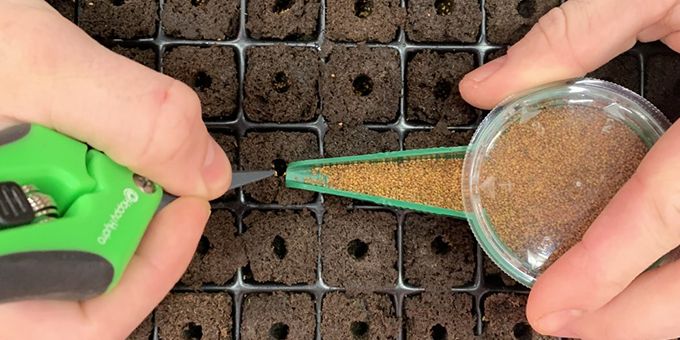With the time spent meticulously seeding each plug not to mention the space constraints in any seedling set-up, it’s imperative that you get enough healthy seedlings out of each tray to stay on schedule.
 Start Your Seeds Off Right in a Germination Chamber
Start Your Seeds Off Right in a Germination Chamber

Article from | ZipGrow
Germinating seeds can be a real hassle. When running a commercial grow operation you need to transplant hundreds, or even thousands, of seedlings per week, which can quickly become a drain on labour, and therefore costs and revenue.
Having poor germination can be a serious problem. With the time spent meticulously seeding each plug (unless you’ve got an auto-seeder) not to mention the space constraints in any seedling set-up, it’s imperative that you get enough healthy seedlings out of each tray to stay on schedule. Any tools that can give an advantage when it comes to seeding and germinating are more than welcome.
Seeds like to be kept uniformly moist but not drenched, otherwise you run the risk of growing mold instead of seedlings. On the other hand, if they dry out too much you can kill them as well. Trying to strike this balance can be a challenge when you’ve got a list of daily chores and tasks to stay on top of. Using a germination chamber replaces the need for humidification domes over individual trays; it also provides better air flow, more constant humidity and temperature controls.
You can think of the germination chamber as a mini-farm nested inside of the larger farm layout. The idea behind controlled environment agriculture is to maximize outputs by seizing the reins and manipulating the environment to make it more conducive to healthy plant growth.
.jpg)
If your plants and seeds have different requirements and you are in a position to cater to both of them individually then why would you not?
Three Doors Down
In Cornwall, Ontario, we have a 1,0002 research and development farm and we use a germination chamber as the first step in starting our seedlings. We use a GC12 by Phytotronic for a few reasons.
Firstly, it’s very reliable; when used properly we tend to get higher than 95 percent germination rate.
Second, it’s easy. It really is a matter of ‘set it and forget it’. So long as the heater and fans are functioning it’s a breeze. There is an inlet and float switch so the unit stays topped up with life-giving water as long as you keep it plumbed in. If you do not have the facilities to have it plumbed in you can also just fill it up about once a month.
There are 12 shelves inside, each able to comfortably hold four 200-plug seedling trays, creating a total capacity of 48 trays or 9,600 seeds. The shelves are easily removable so when it comes to clean the interior of the unit there are no problems.
After preparing the seedling trays and checking the water level in the reservoir the chamber is set to 77°F and then closed for 24 hours. The perfectly moderated environment makes such a difference in getting the seed-husks to crack open.
Once the seeds have germinated it is simple to transition the plug trays to seedling carts to let everything sprout before transplanting the plugs straight into ZipGrow™ Towers.
The content & opinions in this article are the author’s and do not necessarily represent the views of AgriTechTomorrow
Comments (0)
This post does not have any comments. Be the first to leave a comment below.
Featured Product


